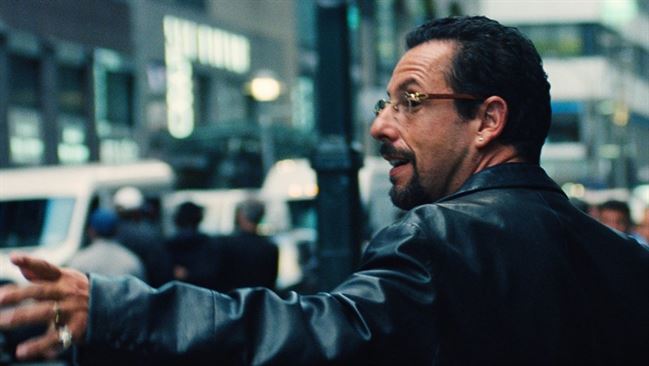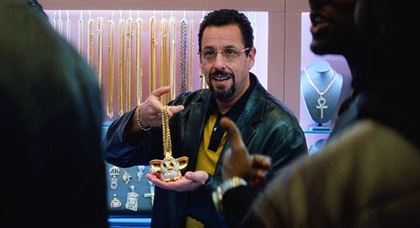Directors of the critically acclaimed hit “Good Time,” Josh and Benny Safdie, bring their signature style to the 2012 Manhattan diamond district, with “Uncut Gems.”
The film is a cautionary tale of hopeful desperation glistening in the sunken eyes of Howard Ratner, played by Adam Sandler, a delusional diamond dealer, who struggles to balance his home, professional and personal life against a destructive gambling addiction. The Safdie brothers are masters of high-stress cinema and “Uncut Gems” is as abrasive as the city streets it’s set in.
Weaving intelligent comedy in the seams of a gritty crime drama, the Safdie brothers deliver a unique period piece, driven by powerhouse performances and a career-best from Adam Sandler. “Uncut Gems” is a unique and immersive crime drama that culminates into one great climactic sequence, though it may not be for the faint of heart.
An ode to crime films of the ’70s, the denial of their protagonists’ addictions and the depraved situations in which they fall as a result, “Uncut Gems” is a tightrope walk balanced by frequent visits to the pawn shop and constant lies. The film chases Howie through the streets of New York as he puts his life, finances and the assets of those around him on the line in pursuit of a big win.
Like a fish in a tank, Howie’s actions are predictable yet mesmerizing and despite their consistency, the Safdie brothers manage to build a tension that keeps audiences engrossed. It is a relentless action-packed roller coaster that constantly raises the stakes making for poignant catharsis.
Its anxious pacing is complemented by the sound design, characterized by a constant cacophony of New York’s loudest characters yelling over one another in conversation and the buzz of Howie’s jewelry shop door.
Tensions are further heightened by composer Daniel Lopatin’s score. The testament to ’80s synth music is a sensual cosmic sound that dances over the chaos and hits the ears like light refracting off of precious stones – bringing the inner conflicts of Howard’s character to the senses. Its melodramatic and twinkling charm epitomizes the attractive qualities of wealth that vindicate Howie’s gambling.
Visually, cinematographer Darius Khondji further emulates the rich ’70s and ’80s aesthetic style with a gritty texture and ripe contrast. Khondji’s invasive camera closes in on characters, keeping an intimate distance when there is nowhere else to turn and stalking them in and out of chaos.
An eclectic mix of secondary characters and a sense of New York realism paint a quintessential background for this Greek-like tragedy. A well-informed world is built on personal anecdotes, family lore and extensive on-the-ground research by the Safdie brothers who shine in their nuance. Their attention to detail in building the feel of the film brings forward a necessary realism that grounds the story.

The Safdie brothers bring a new and interesting flavor to the traditional New York crime film. Photo courtesy of A24
Some of the film’s most entertaining moments are in the interactions with droll enemies and bizarre samaritans. The secondary characters don’t pull from the primary focus but fuel the chaotic energy and further build the world in which they exist.
At the forefront, Sandler delivers a career topping performance that shines in his manic highs and devastating lows. Howie is a corrosive family man that is equal parts deceitful and charming while being entirely inept at both.
With expert comedic timing and masterfully executed dialogue, Sandler maneuvers Howie’s complexities with ease. Whether due to his nature or trustworthy familiarity, Sandler brings warmth to an otherwise emotionally depraved and selfish man.
The capacity to empathize with Howard is completely accredited to Sandler’s performance and is what carries the success of the narrative. The desire for Howard to succeed is coupled with sick satisfaction of watching him navigate his failures, creating a tumultuous relationship that keeps the constant action in the film interesting. Sandler is met by a number of other impressive performances from Julia Fox, Idina Menzel and former basketball player Kevin Garnett.
The Safdie brother’s nihilistic voice tells a fable that illustrates the price of desire which can only culminate in devastating relief. “Uncut Gems” is a visceral white knuckle experience that will put viewers in a sweat, capturing the excitement and anxiety of watching a high stakes sports game for the entirety of its two-hour duration.
If you are not a fan of the New York City subway system, “Uncut Gems” may not be for you. It is dirty, loud and relentless. But, if you can get past the rattling train cars and crude yelling of locals, within the mess of crossed lines, it is a relatable and emotionally rich story of human experience.




